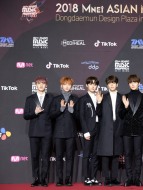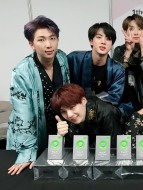K-pop agencies complain over survival programs featuring idol singers
By Yoon Min-sik
Groups representing K-pop agencies jointly sent a letter to local broadcasters on Wednesday, concerning competition-based reality TV shows featuring idol singers or trainees.
The letter was sent to major broadcasting companies including KBS and MBC by Korea Entertainment Producer’s Association, Korea Management Federation and Korea Music Content Industry Association.
“When participants of these programs return to their original teams or agencies, there have been conflicts between the singers and companies or (if the participant is part of a K-pop group) among group members,” said an industry official, on condition of anonymity.
 |
| Now-disbanded group I.O.I, comprised of 11 winners from "Produce 101." |
“Some of these participants have either debuted or are on the brink of an official debut, yet the broadcasters require the winners (of competition programs) to work with them for up to a year. This spells problems for the agencies.”
The associations of talent agencies made two demands to the broadcasting companies: Aid participants of survival programs in returning to their agencies, and shorten the time the winners are required to work with them.
Spurred by the success of Mnet’s “Produce 101” -- a survival program that had 101 wannabe-K-pop singers fighting for an official debut -- other broadcasters are jumping on the bandwagon.
In October, KBS will air a program that will give singers that failed to gain popularity a second chance to make an impression to the public. MBC is also reportedly preparing a program based on idol trainees.
Dispute with agencies
One of the issues that K-pop agencies raise is the conflict that arise between the singers and their original agencies once the shows end.
Kim Tae-dong, who appeared on the second season of “Produce 101,” had a run-in with his agency over his treatment. Other singers like Lee Hae-in and Lee Su-hyun have filed legal charges against their companies over contracts.
In addition to disrupting the schedule for trainees, agencies also allege that the broadcasting companies are stepping into their territory -- that of fostering K-pop artists.
In Korea, it is customary for talent agencies to professionally train prospective talents for years before an official debut. Contracts bind the trainees to the agencies for several years -- some as long as 10 years after an official debut.
Talent agencies complain that the broadcasting companies are harvesting the fruit of their investment.
It is difficult for the agencies to stop their singers from appearing on these shows, as a broadcasting company can “ban” uncooperative singers from appearing on its music shows.
As appearing in such shows is essential for promotional reasons, broadcasters have an upper hand.
“It is a serious imbalance in power (between an agency and a broadcasting company),” said another music industry. “If a broadcasting company were to infringe upon the talent agencies’ domain, there’s not much we can do.
““Back when ‘Produce 101’ was launched, we thought it would be a one-time thing. But now, everyone is doing it. If it’s once or twice, we can manage. But if every broadcaster starts doing it, the talent agencies are done for,” the official said.
By Yoon Min-sik (minsikyoon@heraldcorp.com)




























